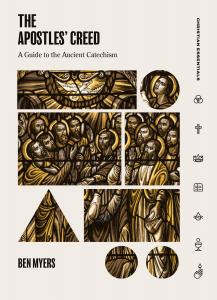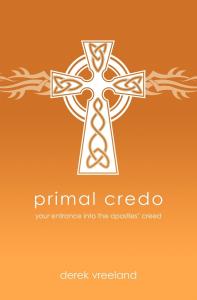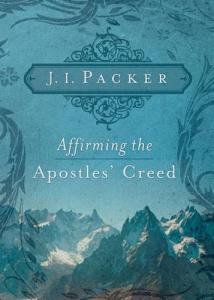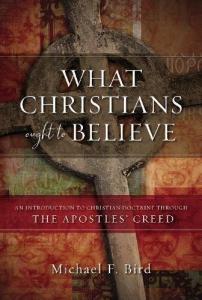 As I mentioned earlier this summer, I am preparing for an adult education discussion class on the Apostles’ Creed as an introduction to Christian doctrine this Fall. The primary resources for this class are the Bible (of course) and four books on the Apostles’ Creed: Primal Credo by Derek Vreeland, Affirming the Apostles’ Creed by J. I. Packer, The Apostles’ Creed by Ben Myers, and What Christians ought to Believe: An Introduction to Christian Doctrine Through the Apostles’ Creed by Michael Bird. Over the next several months I will post on this topic on Thursdays as I prepare to lead the discussion on Sundays. Comments from readers are welcome, and one reason for posting before rather than after the class. The first class is this coming Sunday and thus the first post in this series is today.
As I mentioned earlier this summer, I am preparing for an adult education discussion class on the Apostles’ Creed as an introduction to Christian doctrine this Fall. The primary resources for this class are the Bible (of course) and four books on the Apostles’ Creed: Primal Credo by Derek Vreeland, Affirming the Apostles’ Creed by J. I. Packer, The Apostles’ Creed by Ben Myers, and What Christians ought to Believe: An Introduction to Christian Doctrine Through the Apostles’ Creed by Michael Bird. Over the next several months I will post on this topic on Thursdays as I prepare to lead the discussion on Sundays. Comments from readers are welcome, and one reason for posting before rather than after the class. The first class is this coming Sunday and thus the first post in this series is today.
 All four of these books, but especially Michael Bird’s, begin with a defense of creeds in general and of the Apostles’ creed in particular. The defense is necessary because many Protestants claim to stand on the Bible alone, seeing no need for the creeds. Derek Vreeland (Discipleship Pastor at Word of Life Church in St. Joseph, Missouri) notes the importance of the Apostles’ creed as a stabilizing agent in his spiritual journey – wisdom he was first introduced to by his college advisor (at a secular university no less). “The Apostles’ Creed serves as an extremely useful confession of the essentials of the Christian faith. The ancient church has given the creed to the modern church as an indispensable gift.” (p. 3) Christians need to know some theology – and the Creed is a good way to teach this theology.
All four of these books, but especially Michael Bird’s, begin with a defense of creeds in general and of the Apostles’ creed in particular. The defense is necessary because many Protestants claim to stand on the Bible alone, seeing no need for the creeds. Derek Vreeland (Discipleship Pastor at Word of Life Church in St. Joseph, Missouri) notes the importance of the Apostles’ creed as a stabilizing agent in his spiritual journey – wisdom he was first introduced to by his college advisor (at a secular university no less). “The Apostles’ Creed serves as an extremely useful confession of the essentials of the Christian faith. The ancient church has given the creed to the modern church as an indispensable gift.” (p. 3) Christians need to know some theology – and the Creed is a good way to teach this theology.
 J.I. Packer frames the importance of the creed as a guard against the rather shallow gospel proclaimed in much of North American evangelicalism. The gospel is often reduced to ABC: “(1) all have sinned and come short of the glory of God, you included; (2) believe on the Lord Jesus Christ and you will be saved; (3) confess Jesus Christ as the risen Lord, and he will in due course welcome you into heaven.” (pp. 15-16) This truncated, reduced, and streamlined approach “becomes a misrepresentation, one that sows the seed of many pastoral problems down the road.” (p. 17) The creed was born as a summary syllabus of Christian belief and a response to heretical beliefs espoused by some. Packer singles out the Gnostics in particular. “The Creed’s sequence of topics, and some of its phrases, express not only apostolic teaching but also the explicit negation of Gnostic dualism at every point.” (pp. 18-19) The creed (see the end of this post) lays out the major corner stones of orthodox Christian doctrine.
J.I. Packer frames the importance of the creed as a guard against the rather shallow gospel proclaimed in much of North American evangelicalism. The gospel is often reduced to ABC: “(1) all have sinned and come short of the glory of God, you included; (2) believe on the Lord Jesus Christ and you will be saved; (3) confess Jesus Christ as the risen Lord, and he will in due course welcome you into heaven.” (pp. 15-16) This truncated, reduced, and streamlined approach “becomes a misrepresentation, one that sows the seed of many pastoral problems down the road.” (p. 17) The creed was born as a summary syllabus of Christian belief and a response to heretical beliefs espoused by some. Packer singles out the Gnostics in particular. “The Creed’s sequence of topics, and some of its phrases, express not only apostolic teaching but also the explicit negation of Gnostic dualism at every point.” (pp. 18-19) The creed (see the end of this post) lays out the major corner stones of orthodox Christian doctrine.
Today on our own turf, we face pagan ignorance about God every bit as deep as that which the early church faced in the Roman Empire. The ABC approach is thus not full enough; the whole story of the Father’s Christ-exalting plan of redeeming love, from eternity to eternity, must be told, or the radical reorientation of life for which the gospel calls will not be understood, and the required total shift from man-centeredness to God-centeredness, and more specifically from self-centeredness to Christ-centeredness, will not take place. All that the Creed covers needs to be grasped and taught, as an integral part of the message of the saving love of God. (pp. 22-23)
The ABC gospel alone (apart from a more complete teaching) is a me-centered salvation card.
 Michael Bird gives the best and most complete introduction into the need for the Creed in his first two chapters: Christian Creeds for Beginners and Why You Need the Creed. The Creed (the rule of faith) predates the canon. It does not predate the writings included in our Bible, but it helped to guide the selection of those writings from among a range of others. This means that we can confidently regard readings of the Bible that contradict the rule of faith (Apostles’ creed) as in error.
Michael Bird gives the best and most complete introduction into the need for the Creed in his first two chapters: Christian Creeds for Beginners and Why You Need the Creed. The Creed (the rule of faith) predates the canon. It does not predate the writings included in our Bible, but it helped to guide the selection of those writings from among a range of others. This means that we can confidently regard readings of the Bible that contradict the rule of faith (Apostles’ creed) as in error.
Bird outlines the process: (1) Hebrew Old Testament -> (2) Jesus -> (3) Apostolic Teaching -> (4) Christian Scriptures -> (5) Rule of Faith -> (6) Early Creeds -> (7) Biblical Canon. It is important to realize that steps 4 and 7 are distinct. “Scripture here means “a sacred writing with religious authority.” It does not mean canon as “an authoritative list of authoritative writings made by divine inspiration, carrying divine authority, and universally recognized.” (p. 32) The apostolic teaching handed down not only texts (the writings in our Bibles and others) but also the interpretive framework for understanding them. The rule of faith and the early creeds delineate orthodox belief.
Our churches need creeds – according to Bird “Learning the creeds helps us to grow a truly biblical faith!” (p. 37)
The best thing about the creeds is that they conveniently sum up the main truths of the Christian faith and put them into a concise narrative framework. … A creed is not simply a checklist of things I’m supposed to believe, but a synopsis of the entire sweep of redemptive history that narrates a sequence including God, creation, redemption, and consummation. These are the basic acts in the divine drama as Scripture tells it. (p. 37)
Publicly reciting the creeds means we stand in a single unbroken line that stretches from Jesus and the apostles all the way forward to the churches in our own day. (p. 39)
Bird, of course, has a good deal more to say here. I’ve summarized 40 pages in a few paragraphs. But I’d like to wrap up with a personal reflection. As I began to seriously wrestle with what it meant to be a scientist and Christian in the twenty-first century, it was the creed that kept me anchored. In particular the Apostles’ Creed. I realized that the questions I struggled with the most (centered on a doctrine of Scripture and the centrality of so-called ‘literal’ readings) were not essentials of orthodox Christian faith. The ancient creeds are thoroughly biblical, but say nothing about Scripture. Statements of faith that begin with “We believe in the Bible” or variants thereof are invariably modern. Questioning these is not equivalent to rejecting the Christian faith.
What do you think of Bird’s argument of the interrelation of canon and creed?
Do we need the creed? If so why?
If you wish to contact me directly, you may do so at rjs4mail[at]att.net.
If interested you can subscribe to a full text feed of my posts at Musings on Science and Theology.
I believe in God, the Father almighty,
creator of heaven and earth.
I believe in Jesus Christ, his only Son, our Lord.
He was conceived by the power of the Holy Spirit
and born of the Virgin Mary.
He suffered under Pontius Pilate,
was crucified, died, and was buried.
He descended to the dead.
On the third day he rose again.
He ascended into heaven,
and is seated at the right hand of the Father.
He will come again to judge the living and the dead.
I believe in the Holy Spirit,
the holy catholic Church,
the communion of saints,
the forgiveness of sins,
the resurrection of the body,
and the life everlasting.
Amen.










